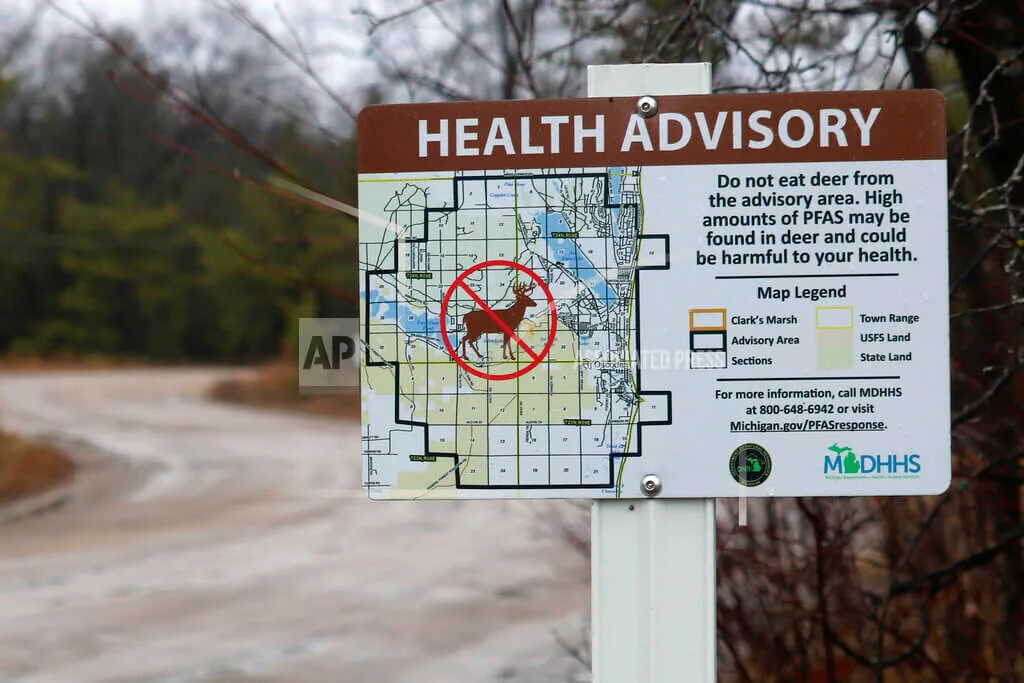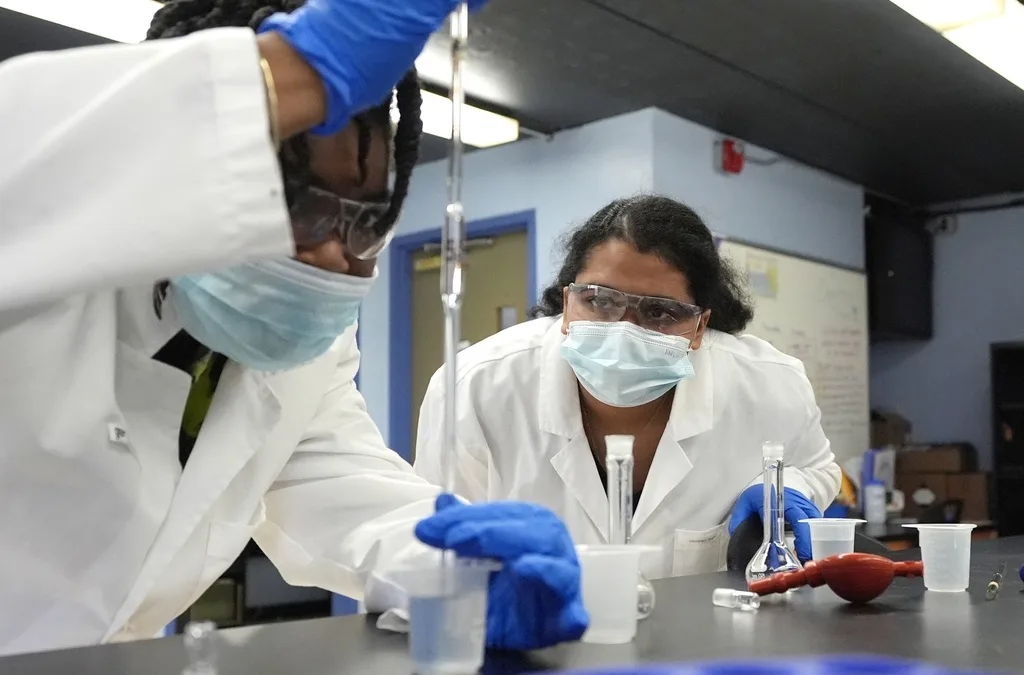
This photo provided by the National Wildlife Federation shows a sign warning hunters not to eat deer because of high amounts of toxic chemicals in their meat, in Oscoda. (Photo by Drew YoungeDyke, National Wildlife Federation via AP)
Environmental activists have new policy demands amid ongoing budget discussions in Michigan—now with at least two-thirds of the state’s counties plagued by PFAS contamination.
LANSING—A coalition of environmentally focused Michiganders is demanding urgent action from state lawmakers to address a “growing public health crisis” threatening the safety of the state’s drinking water.
The culprit: PFAS—or per- and polyfluoroalkyl substances, also known as “forever chemicals” that have been used for decades to manufacture consumer products like nonstick pans, stain- and water-resistant fabrics, food packaging and cosmetics—and have since been unleashed into the state’s drinking water.
“Toxic PFAS chemicals are seriously impacting the health and well-being of people all across Michigan,” Tony Spaniola, co-chair of the Great Lakes PFAS Action Network, said in a statement. “It’s a growing public health crisis, and our [state] Legislature must act swiftly and comprehensively to address it.”
Spaniola and a group of Michiganders impacted by PFAS contamination turned up at lawmakers’ offices in Lansing on Tuesday to make clear that the widespread contamination across the state—despite years of ongoing efforts to address the issue—is still very much a problem in need of more focused solutions.
How bad is it?
State regulators are actively tracking at least 249 PFAS-contaminated sites across both peninsulas and in 56 of Michigan’s 83 counties—including at landfills, manufacturing facilities, airports, military bases and other locations where the chemicals have been used or dumped since they started being used in the 1930s.
State data shows the majority of those sites, so far, have been identified in Kent, Oakland, Kalamazoo, Muskegon, Wayne and Genesee counties—with each tracking at least a dozen contaminated properties.
The sheer extent of the pollution has made it Michigan’s biggest environmental crisis in at least 40 years.
In recent years, researchers have also found PFAS used in an astonishing number of consumer goods, including clothing and paper used to wrap fast food. And because the “forever chemicals” don’t break down and accumulate over time, experts have become increasingly concerned by the potential effects of high concentrations on human health—as well as the impact of contamination on plants and wildlife.
Exposure to the toxic chemicals has also been linked to a number of major health complications including cancer, thyroid problems, autoimmune disorders and reproductive issues. And in 2019, at least some level of PFAS chemicals were found to have leached into the drinking water of nearly 2 million Michiganders.
High levels of contamination have also repeatedly resulted in hunting and fishing advisories in Michigan, with wildlife experts suggesting that more frequent “do not eat” advisories be issued in the near future.
“PFAS contamination is not just a suburban issue or a rural issue—communities across the state from Pontiac to Detroit are also grappling with these toxic contaminants,” state Rep. Brenda Carter (D-Pontiac) said in a statement this week. “We have an opportunity to address this contamination head on and make Michigan a leader in this fight, while protecting our most vulnerable communities.”
What can be done?
This week, the Great Lakes PFAS Action Network renewed its call for immediate action from the state Legislature, unveiling a six-point “Policy Agenda” as lawmakers work to finalize the latest annual budget.

Specifically, the group is calling for legislation and more financial resources dedicated to:
- Making polluters pay—by holding them financially responsible for cleaning up contamination and redressing the harm it has caused in local communities.
- Providing safe drinking water to impacted communities—like offering free bottled water while more permanent solutions are put into place, such as a switch to a safer water supply.
- Prohibiting the sale of PFAS-products—except when no safer alternative yet exists.
- Finding better disposal methods for PFAS—and banning the incineration of PFAS waste.
- Protecting farmers impacted by PFAS—namely by earmarking cash for farmers affected by PFAS in water or soil, with a specific focus on smaller farms and socially disadvantaged farmers.
- Expanding access to PFAS monitoring and testing—especially in rural areas where landowners rely on private wells, and in urban areas situated near pollution-causing industrial activity.
What has already been done?
In 2017, former Gov. Rick Snyder assembled the Michigan PFAS Action Response Team to help assess and develop solutions to the widespread contamination. With continued support from the Whitmer administration, those efforts have led to more than 11,000 potential PFAS sites identified statewide.
Hundreds of millions of dollars have since been spent combating the problem in Michigan—including in Whitmer’s “Building Michigan Together” plan, which last year earmarked more than $40 million in state cash to help local communities identify, monitor, and ultimately clean up PFAS contaminated sites.
In last year’s budget, Whitmer also allocated more than $1.7 billion toward improving the state’s drinking water—including about $1 billion that was specifically allocated toward replacing pipes and removing PFAS. About $700 million in grants also went out for local communities to protect their drinking water.
The state department of Environment, Great Lakes and Energy (EGLE) also invests more than half of its annual budget—which was set at $1.3 billion this year—into local communities in the form of financial assistance to address water infrastructure and other efforts to protect the environment and public health.
In 2021, Whitmer signed an executive directive that restricted the state from purchasing products containing PFAS. This year, Sen. Jeff Irwin (D-Ann Arbor) also introduced legislation that would ban toxic PFAS chemicals from use in food packaging that is manufactured or sold in Michigan.
Attorney General Dana Nessel has also worked to stop the contamination at its source—and hold polluters accountable for cleaning up the mess, and redressing the damage done to local communities.
In 2020, Nessel filed the state’s first PFAS-related lawsuit against 17 alleged PFAS manufacturers. That case resulted in a settlement this year that required Asahi Kasei Plastics to investigate contamination at its former facility near Brighton, and ensure the site is cleaned up to meet healthy regulatory standards. And Nessel isn’t done holding bad actors accountable. Litigation against several other companies is ongoing.
What’s still on the table?
Whitmer’s latest annual budget recommendation, which was still under consideration in the state Legislature this week, included another $69.3 million for the cleanup of contaminated sites statewide—as well as efforts to improve the state’s ability to identify and assess sites with potential contamination.

The proposal also earmarked $100 million to start an “environmental justice” fund dedicated exclusively to cleaning up contaminated sites in historically disadvantaged and underrepresented communities, and provides another $40 million in grants for low-income households to ensure their plumbing is safe.
The annual budget for EGLE is also poised for a steep increase this year—including about $280 million dedicated to water infrastructure in the form of loans, grants, and direct funding to local communities, and another $24 million to collect additional data on the state’s underground drinking water aquifers.
House Speaker Laurie Pohutsky (D-Livonia) said lawmakers plan to keep the issue on the frontburner.
“In Michigan, our water is part of who we are, which is why we must ensure all Michiganders have drinking water that is safe and our rivers, streams and lakes are free from toxic chemicals,” Pohutsky said in a statement this week. “As elected officials, we have a duty to work to protect the health of Michiganders, and that means making addressing PFAS contamination a priority.”
What is the federal government doing?
The 2021 Bipartisan Infrastructure Law is providing Michigan with hundreds of millions of dollars over five years to help local communities impacted by PFAS contamination. And in March, the Biden administration also announced the nation’s first national drinking water standard for PFAS—marking a crucial step in regulators actually being able to monitor and mitigate PFAS pollution nationwide.
Under the new standard, the Environmental Protection Agency will be required to monitor all public water systems for six PFAS chemicals, and notify the public if they exceed the new regulatory standards. Federal officials estimate the new rule will prevent thousands of deaths and reduce tens of thousands of serious PFAS-attributable illnesses—and also help hold polluters accountable for their contamination.
Michigan’s representatives in Congress are also taking actions to address PFAS.
US Rep. Dan Kildee (D-Flint) last week partnered with a Republican lawmaker from Pennsylvania to relaunch a bipartisan congressional “PFAS Task Force,” which has worked across the aisle every year since 2019 to help ensure legislation to address contamination stays on the frontburner in the US House.

“While we have made progress, PFAS continues to be a threat to communities across Michigan and the country,” Kildee said in a statement announcing the reformation of the taskforce. “I look forward to working with my colleagues, both Republicans and Democrats, to address and clean up PFAS chemicals.”
The team of lawmakers is tasked with promoting different pieces of environmental protection legislation, holding informational events to educate other lawmakers (and their staff) about the dangers of PFAS contamination, and fighting for more funding through federal appropriations to remediate the pollution.
Kildee will serve as the co-chairman of the taskforce with Rep. Brian Fitzpatrick (R-Pennsylvania). Other members of Michigan’s congressional delegation on the team include: Reps. Jack Bergman; Bill Huizenga; Debbie Dingell, Hillary Scholten, Elissa Slotkin; Haley Stevens; and Rashida Tlaib.
Kildee has also introduced a bill to ban firefighting foams that contain dangerous chemicals, as well as legislation to ensure that veterans exposed to toxic PFAS chemicals have reliable access to health care.
For the latest Michigan news, follow The ‘Gander on Twitter.
Follow Political Correspondent Kyle Kaminski here.
Politics

Biden makes 4 million more workers eligible for overtime pay
The Biden administration announced a new rule Tuesday to expand overtime pay for around 4 million lower-paid salaried employees nationwide. The...

Biden administration bans noncompete clauses for workers
The Federal Trade Commission (FTC) voted on Tuesday to ban noncompete agreements—those pesky clauses that employers often force their workers to...

Remember Betsy? Michigan education leaders blast Trump for ‘abandoning’ public schools
Michigan lawmakers and teachers are rallying behind President Joe Biden—and reflecting on a rough period for public schools after Trump put Betsy...
Local News

Children of Flint water crisis make change as young environmental and health activists
FLINT—Their childhood memories are still vivid: warnings against drinking or cooking with tap water, enduring long lines for cases of water, washing...

These students are protecting the ‘coral reefs’ of Michigan—and you can too
Vernal pools are a critical part of Michigan’s natural ecosystem—but they’re not protected by state regulations. Here’s how Michiganders are...






